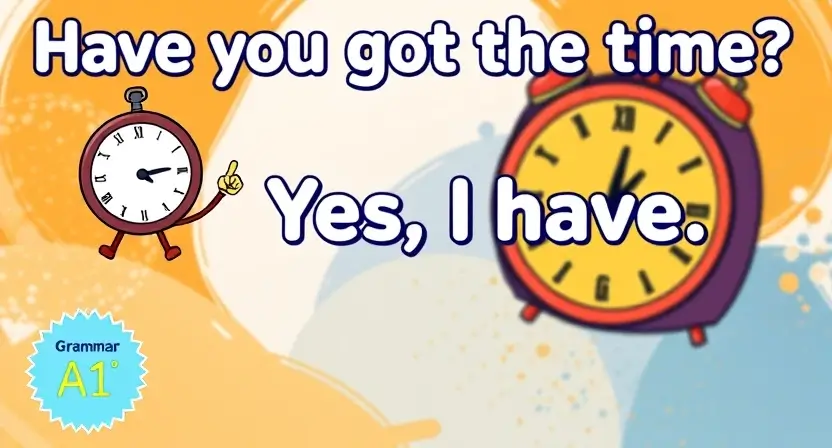Understanding 'Have Got'
- Home ›
- Grammar ›
- A1 Elementary ›
- Understanding 'Have Got'




Choose the correct verb forms to complete the sentences below.
Choose the correct verb forms to complete the sentences below.
Choose the correct verb forms to complete the sentences below.

- 28 November, 2024
- 531
- Grammar
- A1 Elementary
Understanding 'Have Got'
At the A1 level of English, mastering the expression 'have got' is essential for effectively communicating possession and certain characteristics. This guide provides a clear explanation of how to use 'have got' and 'has got' correctly, along with practical examples to enhance your understanding.
What Does 'Have Got' Mean?
The phrase 'have got' is commonly used in English to indicate that someone possesses something or has a particular attribute. It is especially prevalent in British English and is synonymous with the verb 'have' when denoting possession.
Forming Sentences with 'Have Got'
Constructing sentences with 'have got' involves the following structures:
- Affirmative Sentences: Subject + have/has + got + object
- Negative Sentences: Subject + have/has + not + got + object
- Questions: Have/Has + subject + got + object?
Affirmative Sentences
In affirmative sentences, use 'have got' for 'I', 'you', 'we', and 'they', and 'has got' for 'he', 'she', and 'it'.
- I have got a new book. (I possess a new book.)
- She has got a friendly cat. (She owns a friendly cat.)
Negative Sentences
To form negative sentences, insert 'not' after 'have' or 'has'. Contractions are commonly used in spoken and informal written English.
- He has not got a car. or He hasn't got a car. (He does not have a car.)
- They have not got any plans. or They haven't got any plans. (They do not have any plans.)
Questions
For questions, place 'have' or 'has' at the beginning of the sentence.
- Have you got a pen? (Do you have a pen?)
- Has he got a sister? (Does he have a sister?)
Contractions with 'Have Got'
In everyday English, contractions make speech more natural. Here are the common contractions for 'have got':
- I have got → I've got
- You have got → You've got
- He has got → He's got
- She has got → She's got
- It has got → It's got
- We have got → We've got
- They have got → They've got
Usage Notes
While 'have got' and 'have' can often be used interchangeably, 'have got' is more informal and frequently used in British English. In American English, 'have' is more commonly used to express possession.
Examples in Context
- I've got two brothers. (I have two brothers.)
- She's got a meeting at 10 AM. (She has a meeting at 10 AM.)
- We haven't got enough time. (We don't have enough time.)
- Have they got any questions? (Do they have any questions?)
Practice Exercise
Convert the following sentences using 'have got':
- They have a new house.
- Do you have a bicycle?
- He does not have any siblings.
Answers:
- They have got a new house.
- Have you got a bicycle?
- He has not got any siblings.
Conclusion
Understanding and using 'have got' correctly is fundamental at the A1 level of English. It enables you to express possession and characteristics naturally and effectively, enhancing your overall communication skills.
Unfortunately, we currently do not have teaching materials available on this topic. We are working with all our efforts to prepare it. You can subscribe to Verbooze to be notified once the teaching materials are ready.




English Learning Made Easy & Accessible for Everyone
Boost your English skills with interactive lessons, grammar explanations, reading and listening exercises, and real-time feedback. Join our growing community and start improving today — all completely free!

